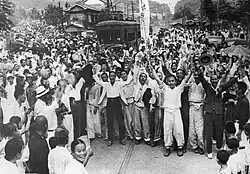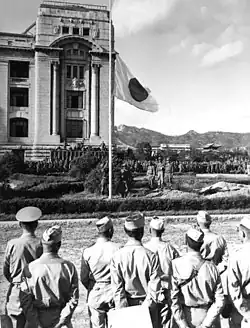| National Liberation Day of Korea | |
|---|---|
 Korean people celebrating their liberation in 1945 | |
| Official name | Chogukhaebangŭi nal (North Korea) Gwangbokjeol (South Korea) |
| Observed by | |
| Type | National |
| Significance | Commemorates Victory over Japan Day, when Korea was liberated from Japanese colonial rule |
| Celebrations | Civilian and military parades, political rallies |
| Date | 15 August |
| Frequency | Annual |
| Liberation Day of Korea | |
| North Korean name | |
|---|---|
| Hangul | |
| Hanja | |
| Revised Romanization | Jogukhaebangui nal |
| McCune–Reischauer | Chogukhaebang'ŭi nal |
| South Korean name | |
| Hangul | |
| Hanja | |
| Revised Romanization | Gwangbokjeol |
| McCune–Reischauer | Kwangbokchŏl |
The National Liberation Day of Korea is a public holiday celebrated annually on 15 August in both South and North Korea. It commemorates the day when Korea was liberated from 35 years of Japanese colonial rule.
Etymology
In South Korea, it is known as Gwangbokjeol (Korean: 광복절; lit. The Day the Light Returned).[1] In North Korea it is known as Chogukhaebangŭi nal (조국해방의 날; lit. Liberation of the Fatherland Day).[2]
The name Gwangbokjeol uses the term “restoration” (복; bog) instead of “independence” (독립; dongnip) to emphasize that Korea had been independent for centuries prior to Japanese rule.[3]
History

The day marks the annual anniversary of the announcement that Japan would unconditionally surrender on August 15, 1945. All forces of the Imperial Japanese Army were ordered to surrender to the Allies.[1] Independent Korean governments were created three years later, on 15 August 1948.
Korea has been an independent nation for centuries, but it had been invaded many times, with the last invasion being the period of Japanese rule. It took three years after Korea became independent in 1945 for the nation to actually establish the Republic of Korea on August 15, when National Liberation Day is celebrated.[3]
August 15th is celebrated by many countries as Victory Over Japan Day, the day Japan's emperor announced the country's surrender. The United States, however, commemorates this day in September when the Japanese formally signed a declaration of surrender.[3]
Liberation Day is the only Korean holiday that is celebrated by both North Korea and South Korea.[4][5][6]
North Korea
.jpg.webp)
In North Korea, it is typical to schedule weddings on the holiday.[7][8]
The holiday is often celebrated with a military parade on Kim Il-sung Square on jubilee years (ex: 25th, 40th, 50th, 60th, 70th anniversaries) with the attendance of the Chairman of the State Affairs Commission and Commander-in-Chief of the Armed Forces of North Korea. The first parade was held in 1949 at Pyongyang Station. It was held again in 1953, and then conducted every year until 1960, when it took a pause until the early 2000s.[9]
2015 North Korea timezone change
On 5 August 2015, the North Korean government decided to change its timezone back to UTC+08:30 effective 15 August 2015, and said the official name would be Pyongyang Time (PYT).[10][11] The government of North Korea made this decision as a break from 'imperialism'; the time zone change went into effect on the 70th anniversary of the liberation of Korea.[12] North Korea reversed the change in May 2018.[13]
South Korea
Public holiday
In South Korea, many activities and events take place on the holiday, including an official ceremony attended by the President of the Republic either at the Independence Hall of Korea in Cheonan or at the Sejong Center for the Performing Arts.[1][14] During the celebration, the flags of different countries around the world hung in the middle of the road around the Jamsil area of Seoul between the Olympic Stadium and Olympic Park are taken down and replaced with South Korean national flags.[3]
All buildings and homes are encouraged to display the South Korean national flag Taegukgi. Not only are most public museums and places open free of charge to the descendants of independence activists on the holiday, but they can also travel on both public transport and intercity trains for free.[1]
The official "Gwangbokjeol song" (광복절 노래) is sung at official ceremonies. The song's lyrics were written by Jeong Inbo (정인보) and the melody by Yoon Yongha (윤용하).[1] The lyrics speak of "to touch the earth again" and how "the sea dances", how "this day is the remaining trace of 40 years of passionate blood solidified" and to "guard this forever and ever".[15]
The government traditionally issues special pardons on Gwangbokjeol.[16][17]
Assassination attempt
At 10:23 a.m., 15 August 1974, Mun Se-gwang, a Zainichi Korean and North Korean sympathizer, attempted to assassinate President Park Chung Hee at the National Theater of Korea in Seoul during a Gwangbokjeol ceremony; Park was unharmed but his wife Yuk Young-soo, the First Lady of South Korea, was killed.[18][19]
In popular culture
- The Peak aka Life of Lee Youk-sa, the Poet who Embraced Epoch, starring Kim Dong-wan of boyband Shinhwa is a two-part special drama broadcast on MBC to commemorate Gwangbokjeol. It is on the life of poet and independence activist, Lee Youk-sa, who lived during the Japanese colonial period, and died in prison at 40 leaving behind some 40 pieces of poetry.[20]
- The third drama rendition of Park Gyeong-ni's epic novel Toji (literally "The Land"), is a 52-episode historical drama which aired from 27 November 2004 to 22 May 2005, was broadcast by South Korean broadcaster SBS as commemoration of the 60th anniversary of Gwangbokjeol; and the only drama rendition after all 21 volumes were completed.[21]
- The ability to pardon prisoners on this day was the theme for a comedy film that was released in 2002, called Jail Breakers, where the main characters escape from prison, only to find out that they are going to be pardoned the next day on National Liberation Day.
See also
References
- 1 2 3 4 5 (in Korean) Gwangbokjeol at Doosan Encyclopedia
- ↑ Seol Song Ah (7 December 2015). "Kim Jong Un's birthday still not a holiday". Daily NK. Retrieved 13 January 2017.
- 1 2 3 4 "National Liberation Day of Korea (Gwangbokjeol) – Celebration of Independence". 22 March 2016.
- ↑ Defector from North Korea describes (in Japanese) differences in attitudes and emphasis. 金, 柱聖. "反日沸騰の韓国と大違い?北の8月15日". YouTube. Fuji News Network. Retrieved 17 August 2020.
- ↑ "8월 15일 한국만 독립한 거 아냐…또 어디? – 머니투데이". news.mt.co.kr. 15 August 2013.
- ↑ "北, 공화국 창건 역사 살펴보기". 통일뉴스. 7 September 2014.
- ↑ Toimela, Markku; Aalto, Kaj (2017). Salakahvilla Pohjois-Koreassa: Markku Toimelan jännittävä tie Pohjois-Korean luottomieheksi (in Finnish). Jyväskylä: Docendo. p. 40. ISBN 978-952-291-369-2.
- ↑ "North Korea Liberation Day".
- ↑ Sep. 8, Associated Press; Pt, 2018 3 Am (8 September 2018). "North Korean military parades: 70 years of propaganda, intimidation and unity". Los Angeles Times.
{{cite web}}: CS1 maint: numeric names: authors list (link) - ↑ "North Korea to introduce new timezone this month". BNO News. 7 August 2015. Archived from the original on 25 September 2015. Retrieved 7 August 2015.
- ↑ "North Korea's new time zone to break from 'imperialism'". BBC News. 7 August 2015. Retrieved 7 August 2015.
- ↑ Mathis-Lilley, Ben (7 August 2015). "North Korea Invents New Time Zone, 'Pyongyang Time'". Slate.
- ↑ "The brief history of North Korea's time zone". Washington Post. 4 May 2018. Retrieved 15 August 2023.
- ↑ (in Korean) Gwangbokjeol ceremony, Yonhap News, 15 August 2009. Retrieved 19 June 2010
- ↑ (in Korean) Gwangbokjeol Song Archived 10 October 2007 at the Wayback Machine at the Ministry of Patriots and Veterans Affairs
- ↑ (in Korean) Gwangbokjeol pardons, Asia Today 11 August 2009. Retrieved 19 June 2010
- ↑ (in Korean) Gwangbokjeol pardons, YTN 11 August 2009.Retrieved 19 June 2010
- ↑ Keon, Michael (1977). Korean Phoenix: A Nation from the Ashes (Hardback). Prentice-Hall International. p. 199. ISBN 978-013-516823-3.
- ↑ Jager, Sheila Miyoshi (2013). Brothers at War: The Unending Conflict in Korea (Hardback). London: Profile Books. p. 415. ISBN 978-1-84668-067-0.
- ↑ Ho, Stewart (24 April 2012). "Kim Dong Wan's MBC Drama Receives Award at Houston International Film Festival". enewsWorld. CJ E&M. Archived from the original on 29 January 2013. Retrieved 16 December 2012.
- ↑ "List of Korean Historical Dramas (1981–2002) – Chicago Korean Drama Fan Club". deiner.proboards.com.
Further reading
- South Korea Independence Day at Holidays around the World
External links
 Media related to National Liberation Day of Korea at Wikimedia Commons
Media related to National Liberation Day of Korea at Wikimedia Commons Works related to Proclamation of Korean Independence at Wikisource
Works related to Proclamation of Korean Independence at Wikisource- The Independence Hall of Korea
- Gwangbokjeol Song, video clip made in 1958 at the Ministry of Public Administration and Security's official blog (in Korean)
- Gwangbokjeol Song at the Ministry of Patriots and Veterans Affairs (in Korean)